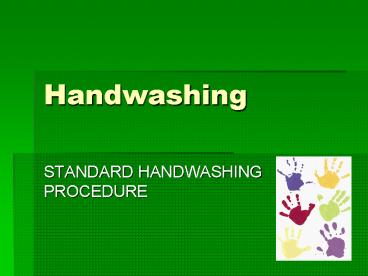Handwashing - PowerPoint PPT Presentation
Title:
Handwashing
Description:
Indication for hand hygiene A. When hands are visibly dirty, contaminated, or soiled, wash with non-antimicrobial or antimicrobial soap and water. B. – PowerPoint PPT presentation
Number of Views:206
Avg rating:3.0/5.0
Title: Handwashing
1
Handwashing
- STANDARD HANDWASHING PROCEDURE
2
Rationale
- An understanding of safety as it relates to
community and self is necessary for the delivery
of quality health care.
3
Objectives
- Upon completion of this lesson, the student will
be able to - Demonstrate proper hand washing procedure
used in the health care settings - Demonstrate an understanding when hand sanitizer
maybe used in place of performing standard hand
washing procedure - Demonstrate proper technique for using hand
sanitizer and Evaluate a peer using skills
check.
4
Standard Handwashing Procedure
- I. According to OSHA standards regarding blood
borne pathogens, hand washing should be
performed, at a minimum - A. Before and after every patient contact
- B. After removing gloves and other protective
wear - C. After handling blood or other body fluids
- D. When visibly contaminated with blood or
tissues - E. Before leaving the patient area
- F. Before and after eating, applying makeup,
using the bathroom, handling contact lenses,
handling equipment
5
Standard Handwashing Procedure
- II. Importance of handwashing to reduce
nosocomial infections - A. Required in any health care profession.
- 1. Reduces spread of disease from patient to
patient - 2. Reduces spread of disease from patient to
health care professional
6
II. Importance of handwashing to reduce
nosocomial infections
- 3. Reduces spread of disease from health care
professional to patient - 4. Reduces spread of disease from health care
professional to other health care professionals - 5. Reduce spread of disease to visitors in the
health care facility
7
III. Proper handwashing techniques include
- A. Soap aids in the removal of pathogens.
- B. Warm water
- C. Friction
- D. All surfaces of the hands must be cleaned
palms, backs, between the fingers. - E. Nails must be cleaned.
8
Proper handwashing techniques include
- F. Fingertips pointed downward prevents water
from getting on forearms and then running back
down onto the hands and re-contaminating them. - G. Dry paper towels are used to turn faucet on
and off prevents contamination of hands from
organisms on the faucet.
9
Indication for hand hygiene
- A. When hands are visibly dirty, contaminated, or
soiled, wash with non-antimicrobial or
antimicrobial soap and water. - B. If hands are not visibly soiled, use an
alcohol-based hand rub for routinely
decontaminating hands.
10
Cleaning Hands with Waterless Hand Sanitizer
(also known as hand rubs)
- I. Hand sanitizers work to kill microbes
chemically - II. Waterless hand sanitizer provides several
advantages over hand washing with soap and water.
However, they are not effective if organic matter
(dirt, food, or other material) is visible on
hands.
11
Cleaning Hands with Waterless Hand Sanitizer
(also known as hand rubs)
- III. Benefits of waterless hand sanitizer
- A. Require less time than hand washing
- B. Act quickly to inhibit microorganisms on hands
- C. Are more accessible than sinks
- D. Reduce bacterial counts on hands
- E. Do not promote antimicrobial resistance
- F. Are less irritating to skin than soap and
water - G. Some can even improve condition of skin
12
Cleaning Hands with Waterless Hand Sanitizer
(also known as hand rubs)
- IV. Both components, waterless hand sanitizer and
friction, should be used - increase effectiveness. Four steps
- A. Make sure all organic matter is removed from
hands. All visible organic matter (for example
dirt) must be removed from hands prior to
applying waterless hand sanitizer.
13
Cleaning Hands with Waterless Hand Sanitizer
(also known as hand rubs)
- B. Apply a dime sized amount of waterless hand
sanitizer to the palm of one hand or use a
waterless hand sanitizer wipe. - C. Rub hands together covering all surfaces of
hands and fingers. - D. Rub until waterless hand sanitizer is
absorbed.































